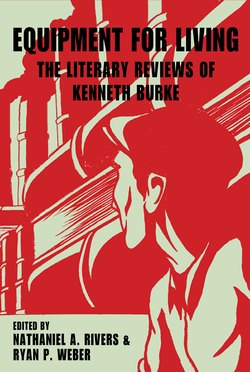Читать книгу Equipment for Living - Kenneth Burke - Страница 40
На сайте Литреса книга снята с продажи.
ОглавлениеField Work in Bohemia
This Room and This Gin and These Sandwiches by Edmund Wilson. The New Republic
The Nation, July 1937, 133–134
There are the people who work with materials: farmers, men in factories and on construction. There are the people who carry on the services that coordinate these acts: trainmen, telegraph operators, shipping hands. There are the people who keep the books involved in the productive and distributive pattern: the accountants, stenographers, filing clerks. There are the people who trade in the symbols by which the books are kept: bankers, financiers, speculators, promoters, business men. There are the people who coach the responses to these symbols: educators, publicists, journalists, editors, politicians. There are the “contradictions”: people out of jobs, business men crippled by other business men, monopolists fighting monopolists, racketeers, gangsters, radical propagandists.
And there is a special, somewhat abstract, highly mobile group of people who may, with varying degrees of success, live off the total muddle. These are in part the people with income, and the entertainers, the artists. Materially they are rewarded, or hope to be. Occasionally they may “go away” to some earthy spot in search of, and sometimes in temporary discovery of, an idyll. When congregating they can build up a somewhat isolated world, with its own values, its own scandals, its own concepts of obligation, trial, heroism, and defeat. They are on the fringes—the fringes of political radicalism, of philosophy, of wisdom, of service, of the soil, of ecstasy and drought, of religion, of moralization and demoralization. They make up the stratum of life depicted in Wilson’s three clever, engrossing, and moralistic plays.
The steam locomotive is said to be a very inefficient machine; but it is the essence of sound performance as compared with the operations of contemporary society—yet the social plant jerks along somehow, and while it continues it can manage to support a certain percentage of people in this mobile, abstract way of life, with their peculiar kind of secular “other-worldliness.” In particular it did so during the war and post-war periods of inflation. And Wilson here gives us a vigorous and imaginative version of this way.
The three plays are points that plot a curve. In the first, “The Crime in the Whistler Room,” we get a mixture of realism and fantasy serving as the rites of initiation. It is a ritual of rebirth, a shift in perspective exemplifying in imaginative terms the following proposition: If one abandons one mode of living for another, and the two seem sufficiently at odds, one can call the second mode “life” only by feeling that the earlier mode was “death.” Hence we watch a preparation for bohemian “life” in contrast with a respectable family who act like corpses. The heroine is the Beatrice who guides the hero on his journey—and she helps a lot through being got by him with child, though he appears in some of the fantastic scenes as a werewolf.
In the second play, “A Winter in Beech Street,” we are wholly within this special world. I doubt whether any one else will catch as well as Wilson does here the norms of sociality that developed about the theater projects of the Provincetown Players as the American center of bohemian protest. The inventiveness of the dialogue is very appealing; one is sometimes startled out of his engrossment at the sudden realization that it is even depicting delirium tremens joyously.
In the third, “Beppo and Beth,” we come closest to attempts at finding a way out. And after a scene of violently alcoholic protest against the void lurking beneath alcohol, with one suicide stopped only by another attempted suicide, we end:
BEPPO: We’ll get married again tomorrow and we’ll take the first boat to Mexico!
BETH: Why Mexico!
BEPPO: Because Mexico’s the place where they make those little pottery animals!
BETH: You broke the little bank just now when you pulled the tapestry down.
BEPPO: I know; I want to get a new one! The train to Mexico City will be our P. L. M. Express! We’ll revive the old rebellion!
BETH: You’d better pick up those pennies: we’ll need them!
Not forgetting Chang and Chung, the Chinese servants, who had patiently, at intervals, explained to Beppo the Marxist theories of capitalist decay, and did it very well, with what looks like a good stage effect, in the midst of all the hubbub and the antics.
The talent and the incongruities of bohemianism are conveyed in lines that are bright and limpid. The void is made tremendously real, all the more so since the patter that conceals the void is given with verve. “Well, we may not have got the whole of everything,” says Sally of the Beech Street Players in a moment of inventory, “but we’ve got something very precious at this moment—we’ve got this room and this gin and these sandwiches, and we’ve got each other’s very agreeable company!” Or, as another character who has invented a new religion puts it: “All the religions of the past have either mortified the flesh in the interests of the spirit or have stinted the spirit in the interests of the flesh: and this is the first religion in history that has promoted the highest development of the spirit and at the same time facilitated the ecstasies of the flesh!”
If one would see Murger’s world again, shown with an accuracy and taste for comedy that Murger’s sentimentalizing made him incapable of, one should read these plays. And if one feels moralistic, he can discern on every page the pressure of the money economy behind the antics.
